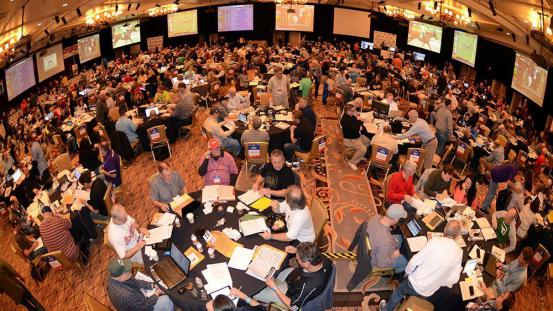- Commissioner’s statement on Ventura, Marte
- Ronnie O’Sullivan: Masters champion ‘felt so vulnerable’ in final
- Arron Fletcher Wins 2017 WSOP International Circuit Marrakech Main Event ($140,224)
- Smith challenges Warner to go big in India
- Moncada No. 1 on MLB Pipeline’s Top 10 2B Prospects list
- Braves land 2 on MLB Pipeline’s Top 10 2B Prospects list
- Kingery makes MLB Pipeline’s Top 10 2B Prospects list
- New Zealand wrap up 2-0 after Bangladesh implosion
- Mathews, Pradeep, Gunathilaka to return to Sri Lanka
- Elliott hopes for rain for Poli
Can tournament play jump-start horse racing betting?
- Updated: May 18, 2016

1:31 PM ET
As the elevator doors open onto the second floor of the Treasure Island (TI) casino, you could be forgiven for almost forgetting you’re in Las Vegas. The nondescript floor feels like nearly any hotel conference center in the country; surroundings dominated by bright, ugly and slightly-worn carpet and overly ornate wall decorations.
On this windy, sunny Saturday in January, a week before Super Bowl fever consumes the entire Las Vegas strip, a different sport has taken over TI: Behind a long buffet table of lunch food stretches a banner welcoming all to the National Thoroughbred Racing Association’s National Handicapping Championships (NTRA NHC).
Now in its 17th year, the NHC is the culmination of a year-long series of qualification tournaments and brings the best horse racing handicappers together for a three-day tournament to crown the handicapper of the year.
While more commonly associated with places like Louisville and Saratoga, New York, it is fitting that handicapping comes west to Vegas each winter. It may be forgotten now, but horse racing was largely responsible for turning the quiet western town of Las Vegas into VEGAS. Ben “Bugsy” Siegel was the man most responsible for building the Las Vegas strip, controlled horse racing result wires in the western United States and — with the help of some “friends” back east — helped fund the first casinos on the Strip.
The first Monday in May this year saw $192.6 million, the second-highest betting total ever, collected on the Kentucky Derby across all sources — 1 percent fewer than last year’s initial leg of American Pharoah’s eventual Triple Crown.
But last year was only the second time in the past decade that saw a rise in total horse race betting handle, as it grew 1.2 percent (across a smaller number of races, this was a 7.25 percent growth on a per race basis). Since setting a record handle in 2003, horse racing handle and the total number of horse races held annually have been in steady decline, as the table below shows.
U.S. Pari-Mutuel Betting Handle
($ in 000,000’s)
YearOn trackOff trackTotal% Change20031,90213,27815,1800.820041,86013,23915,099-0.520051,74112,82014,561-3.620061,68813,09714,7851.520071,67013,05514,725-0.420081,48912,17313,662-7.220091,32510,99012,315-9.920101,19910,22011,419-7.320111,2299,54110,770-5.720121,2399,64310,882120131,1859,69210,877020141,1759,37710,552-320151,1229,55310,6751.2
It is easy to surmise that American Pharoah’s Triple Crown win, the first in 40 years, was the impetus for this small beam of sunshine. The first couple of months of 2016 have continued to see the afterglow of American Pharoah’s success, with handle up over 4 percent compared to last year. But if no great horse emerges again this year, will the new bettors stick around for the long haul?
Combining American Pharoah’s success with the national growing acceptance of gambling would seem to make now the time for horse race handicapping to permanently reverse its decline.
Are tournaments like the NHC the answer and a way to appeal to a younger generation of bettors?
NHC participation is increasing
Despite the dire statistics about the overall horse racing handle’s steady decline, NHC participation has grown steadily. The first NHC in 2000 had 160 participants and a total purse of $200,000. This year, TI required a spillover room to fit in the record pool of 629 players competing for a total prize pool that has climbed above $2.77 million.
While there are a number of variants on tournament play, most involve a one-time buy-in followed by regulated, simulated bets on a number of races. The players that didn’t buy in earned their spot in one of the qualifying tournaments that span the spring, summer and fall. Tournaments are held on-site at specific racing tracks where players compete against the guy at the next table on the races run immediately in front of them. They are also held online, through popular sites like TwinSpires, HorseTourneys and DerbyWars where competitors can be located anywhere, and bet on a pre-determined set of races from across the country.
At the NHC in Vegas, competitors place theoretical $2 bets on a horse to win and place in a number of designated races. After two-and-a-half days of winnowing the field across a number of mandatory and optional races, on Saturday afternoon, the 10 players with the highest remaining bankrolls compete in a final seven mandatory races. The player with the largest bankroll at the end is the winner.
Treasure Island hosted the National Thoroughbred Racing Association’s National Handicapping Championships in January. Horsephotos
Similar to poker’s rapid rise earlier this century, growth is being fueled by online tournaments. “It has become easier to participate in the last half dozen or so years [because of] the internet,” says Keith Chamblin, NTRA Chief Operating Officer and NHC Tournament Director. In 2015, 353 of the 629 (56 percent) NHC participants qualified through online contests.
The NHC is still awaiting a “Chris Moneymaker moment” that explodes its growth and brings it mainstream, but it is seeing steady, consistent growth. There were 161 separate qualifying tournaments held last year; this year, the NTRA expects at least 185 contests.
The other large profile handicapping tournament, The Breeders Cup Betting Challenge, …
continue reading in source espn.go.com
